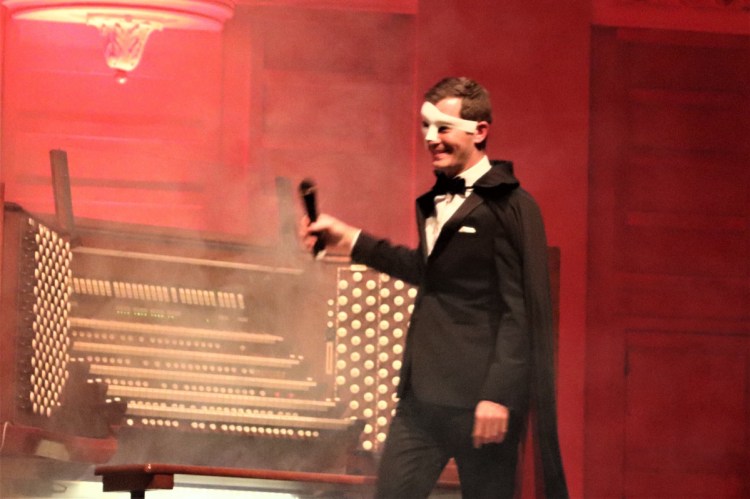The Friends of the Kotzschmar Organ threw their annual Halloween concert at Merrill Auditorium on Tuesday evening, complete with an onstage costume competition and a spooky film from the silent era – this time, “Nosferatu,” F. W. Murnau’s 1922 telling of the Dracula story – accompanied by an improvised organ score.
In the four years I’ve attended these concerts, the accompaniments have been supplied by guest organists who include scoring silent films among their specialties. This year, James Kennerley, Portland’s new municipal organist, took on the task himself, and at the start of the evening, he was also the master of ceremonies, dressed for the occasion in a black cape with a red lining, and a “Phantom of the Opera” mask. (Kennerley is, in fact, playing all the concerts on this year’s Kotzschmar series.)
It was a smart move. Whether or not Kennerley plans to hold the position as long as his predecessor, Ray Cornils (27 years), he needs to become a presence here while curiosity about him, as “the new guy,” remains high. He has already played a few concerts, and in his pre-concert talks and comments from the stage, he has quickly established himself as both charming and erudite.
This time, he showed that he is in touch with his silly side, as well, and that he is game to throw himself into local traditions. He also took the opportunity to do some audience building, telling his listeners – the Halloween concerts are typically the best-attended organ concerts of the year – that they should return with their friends.
That should not be necessary, but sadly, it is: I’ve attended Kotzschmar recitals by some magnificent players, with fewer than 200 in attendance.
Most crucially, from a purely musical perspective, Kennerley demonstrated that reports of his skill as an improviser were accurate.
When Friends of the Kotzschmar Organ last presented “Nosferatu,” in 2015, Tom Trenney was at the console and provided a score that aimed partly to underscore the film’s intensive creepiness, but which was also filled with amusing asides, in the form of quotations from pop songs and familiar classics, to illuminate certain scenes with humor.
Kennerley took a different approach. Rather than treat these antique horror films as the camp classics they have become, Kennerley took “Nosferatu” seriously, on its own terms. So there were no comic references and no overt allusions to other musical works, popular or classical, apart from quoting the Dies Irae – the Gregorian chant for the dead – during a funeral scene.
That’s not to say that he did not lean on the conventions of musical language as listeners have come to understand it over the centuries. Cascading dissonances and quick running figures underscored the tension within several scenes. Glimpses of the countryside were accompanied with gentle, lilting timbres. Characters sometimes had leitmotifs that developed from the simple to the elaborate. And much of the score had a serene, hazily Gallic sound.
Was Kennerley’s use of French-influenced harmonies and timbres at odds with the imagery of the German film, which takes place in Germany and Transylvania? Perhaps, at times. But there was a healthy amount of tone-painting as well. Kennerley used the organ’s bell sounds astutely, sometimes matching them tightly to clocks announcing the time, sometimes simply building themes with them. And the serenity of his score easily gave way to eeriness when Max Schreck’s pointy-eared, talon-equipped Nosferatu was seen looming.
During the costume competition before the screening, Kennerley added some musical commentary in the form of Bach’s Toccata and Fugue in D minor, music from a couple of John Williams film scores (the shark theme from “Jaws” and the “Imperial March” from “Star Wars”) and the opening of Strauss’ “Also Sprach Zarathustra.” These were a little slapdash, in truth, but Kennerley’s playing during the film was masterly.
Allan Kozinn is a former music critic and culture writer for The New York Times who lives in Portland. He can be contacted at:
allankozinn@gmail.com
Twitter: kozinn
Send questions/comments to the editors.



Success. Please wait for the page to reload. If the page does not reload within 5 seconds, please refresh the page.
Enter your email and password to access comments.
Hi, to comment on stories you must . This profile is in addition to your subscription and website login.
Already have a commenting profile? .
Invalid username/password.
Please check your email to confirm and complete your registration.
Only subscribers are eligible to post comments. Please subscribe or login first for digital access. Here’s why.
Use the form below to reset your password. When you've submitted your account email, we will send an email with a reset code.